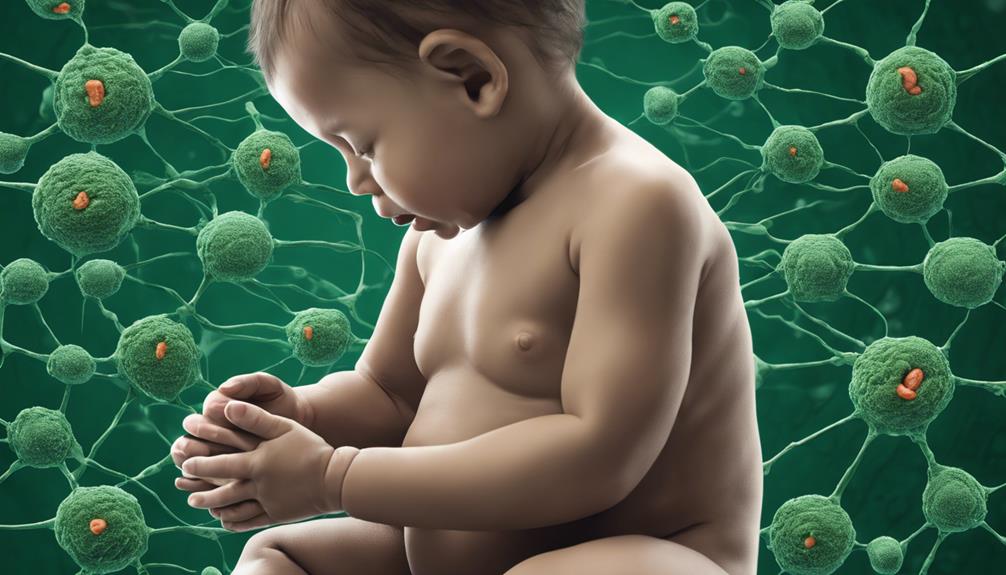Deciphering the enigma of dark green poop in newborns is similar to solving a complex puzzle that reveals insights into the baby’s health.
These seven causes offer a glimpse into the intricate world of infant digestion, providing insights that might surprise even seasoned parents.
Understanding these factors could be the key to unraveling the color code of your little one's diaper contents, offering a window into their health that goes beyond the surface.
Key Takeaways
- Meconium transition to regular stools can lead to dark green poop in newborns.
- Excess bile production during digestion can cause dark green stool.
- Foremilk-hindmilk imbalance affects stool color, resulting in dark green poop.
- Illness or consumption of green foods can also be reasons for dark green poop in newborns.
Meconium in Newborns
Meconium, the initial stool produced by newborns, serves as an important indicator of their digestive system's health. This dark green substance is composed of amniotic fluid, skin cells, and mucus that the baby ingests while in the womb. Despite its notorious difficulty to clean, meconium is odorless since the baby's gut lacks the bacteria responsible for the typical fecal smell.
The passing of meconium within the first days after birth is a reassuring sign of a healthy digestive system in newborns. As the baby begins to feed on colostrum or milk, the color of the stool gradually changes from dark green to a lighter shade, marking the shift from meconium to regular stools.
Understanding the significance of meconium can provide valuable insights into a newborn's well-being. It showcases the baby's ability to expel waste accumulated during their time in the womb and kickstarts the digestive process essential for nutrient absorption and growth. Meconium, with its unique composition and color, plays an important role in the initial stages of a newborn's life, setting the stage for a healthy digestive journey ahead.
Excess Bile Production

Excess bile production in newborns can result in dark green poop, indicating elevated levels of bile in their intestines, leading to the distinct greenish hue of their stools.
In newborns, especially breastfed babies, the digestive system is still developing, and excess bile production can cause dark green poop. Bile pigments, which are responsible for the green color, may not be fully broken down due to the rapid digestion process in infants.
This phenomenon is commonly observed during the change from meconium, the baby's first stool, to regular stool. The immature digestive processes in newborns can sometimes lead to dark green poop as their bodies adjust to the processing of bile.
While it may be concerning for parents, dark green poop in newborns is often a normal occurrence linked to the maturation of their digestive system and the way bile is processed.
Foremilk-Hindmilk Imbalance
In newborns, a foremilk-hindmilk imbalance can lead to green, frothy, or explosive stools, affecting their digestion and overall well-being. When babies consume more foremilk, which is thinner and lower in fat, than hindmilk, rich in essential fats and calories, it can disrupt their digestive system.
This imbalance not only affects the color and consistency of stool but also impacts weight gain and hunger satisfaction in infants. To address this issue, making sure that babies have longer nursing sessions can help balance their intake of foremilk and hindmilk. By allowing babies to feed more extensively on one breast before switching, mothers can make sure that their little ones receive the necessary nutrients from hindmilk.
Correcting the foremilk-hindmilk imbalance can lead to improved digestion, reduced instances of green stools, and overall better health for the baby. So, paying attention to the duration of nursing sessions and balancing foremilk and hindmilk intake is essential for the well-being of newborns.
Illness as a Possible Cause

When newborns exhibit dark green poop, it can often be attributed to underlying illnesses such as gastrointestinal infections or specific medical conditions. Gastrointestinal infections, commonly caused by bacteria like Salmonella or E. coli, can lead to dark green stool in infants.
Additionally, stomach bugs and malabsorption disorders are known culprits for the unusual color of stool in newborns. Medical conditions such as biliary atresia, a blockage in the bile ducts, or inflammatory bowel diseases like colitis and Crohn's disease, can also manifest as dark green poop in babies.
If a newborn consistently passes dark green stool or displays other concerning symptoms alongside it, consulting a healthcare provider is essential for proper evaluation and management. Identifying the root cause early on can help in providing appropriate treatment and ensuring the baby's health and well-being.
Consumption of Green Foods
Green foods such as spinach, kale, or broccoli can result in dark green poop in newborns. The chlorophyll present in these green vegetables is a common culprit for the stool's darker hue. Additionally, food dyes or additives in the breastfeeding parent's diet can also influence the color of the baby's poop.
Remember that dark green poop caused by green foods is typically harmless and not a cause for alarm. If the baby is exclusively breastfed, the mother's intake of green vegetables can directly impact the color of the baby's stool.
Here are some key points to bear in mind:
- The natural pigments in green veggies can lead to dark green poop.
- Food dyes in the mother's diet may affect the baby's stool color.
- Exclusive breastfeeding can intensify the link between the mother's diet and the baby's poop.
- Dark green poop from green foods is generally harmless in newborns.
- Consult a healthcare provider if concerned about the color or consistency of your baby's poop.
Frequently Asked Questions
What Does Dark Green Poop Mean in Newborns?
Dark green poop in newborns may indicate bile pigments in the digestive tract. It's often due to meconium changing to regular stool. Usually normal within the first days of life. Monitoring the shift to yellowish brown stools helps track bowel movement progression.
What Does Dark Green Poop Mean?
Dark green poop means the journey from the dark side to the sunny side of newborn digestion. It signals the shift from meconium to regular stools, showing their tiny tummies are adapting well. It's nature's color wheel!
What Does Dark Poop Mean in Babies?
Dark poop in babies may signal various health issues needing assessment by a healthcare provider. It could indicate blood presence or dietary factors. While common causes include iron supplements, dark-colored foods, or formula types, consulting a doctor is important for proper evaluation.
How Do I Stop My Breastfed Baby From Having Green Poop?
To stop our breastfed baby from having green poop, we guarantee longer nursing sessions on each breast for ample hindmilk. We monitor diet to avoid excessive green foods. Consulting with a healthcare provider helps adjust feeding practices for healthier poop color.
Conclusion
To sum up, dark green poop in newborns can be caused by various factors such as meconium shift, excess bile, breastmilk imbalance, illness, and green foods consumption. While typically not a cause for concern, it's important to monitor any changes in poop color, consistency, and frequency.
Remember, seeking medical attention is essential if accompanied by discomfort, severe symptoms, or dehydration concerns. Stay vigilant, stay informed, and prioritize your baby's health above all else.









